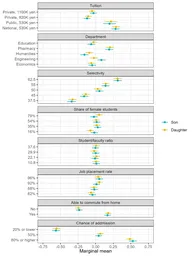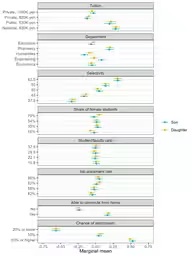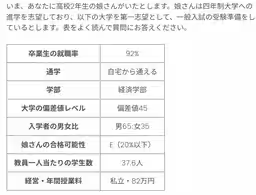

Parental Expectations Shape Girls' College Choices in Japan's Education System
Understanding Gender Disparities in College Choices
In recent years, the increasing acceptance of women in higher education in Japan has come to the forefront. Despite the improvement in enrollment rates, research indicates that the application rates of girls to prestigious universities still lag behind those of boys. A groundbreaking study by Professor Yoshikuni Ono of Waseda University and his research team has revealed that parental expectations significantly influence the college choices of high school girls, suggesting that gender perceptions play a crucial role.
Key Findings of the Study
The study highlights that while girls' overall university enrollment rates are similar to boys', their bias against applying to difficult universities persists. The researchers conducted an experimental survey involving 3,000 adults nationwide, focusing on how parents evaluate their children’s college options based on gender. It was found that parents tend to encourage daughters to apply to universities with a high proportion of female students, particularly in humanities fields, while showing a reluctance to support applications to engineering schools for daughters.
Parental Bias in College Choices
One of the significant revelations from this research is the link between traditional gender roles and parental guidance. Parents who harbor a traditional view of gender roles are less likely to recommend that their daughters aim for prestigious, traditionally male-dominated fields, such as engineering. As shown in the study, when girls express interest in universities that align with societal expectations of femininity, such as those with a higher proportion of female students or in the arts, parents respond positively.
The study demonstrates that parents frequently associate university success and economic advantages with their sons, leading to a disparity where daughters are not encouraged to pursue challenging academic paths, further perpetuating educational inequalities.
Gender Bias and Its Implications
The implications of this study are far-reaching. It highlights the unconscious biases that parents harbor when making educational recommendations for their children. These biases contribute to systemic gender gaps in higher education, where girls may self-select out of rigorous academic environments not due to a lack of capability but due to perceived societal expectations.
The research findings urge stakeholders in the education sector to reconsider admission policies and support mechanisms to address these biases. Understanding that parental expectations can negatively impact a girl’s ambition toward higher education opportunities is crucial for developing strategies to combat gender discrimination.
Addressing Educational Disparities
The study, published in the journal 'Research in Higher Education', advocates for changes in college admissions and counseling. There is a need for educational institutions to create environments that foster gender equity and encourage girls to pursue diverse fields, including those traditionally viewed as male domains.
Moreover, the research highlights the growing implementation of initiatives such as 'women's quotas', which aim to correct gender imbalances in university admissions. Starting from 2024, certain technical universities in Tokyo will reserve a portion of their admission slots for female applicants, a policy that is expected to gradually spread across Japan.
Future Directions
This research paves the way for further studies addressing the complex intersection of gender perceptions, parental influence, and educational aspirations. Future investigations could link actual university application data with parental behaviors, delve into family discussions surrounding education, and make cultural comparisons to uncover the underlying factors contributing to these gender biases.
Conclusion
Ultimately, the findings of this study shine a light on the critical role that parental expectations play in shaping educational pathways for girls in Japan. By comprehending the prejudices that influence decision-making, educators, and policymakers can implement techniques that support all students in pursuing the college and career paths they desire, irrespective of gender. The revelation of how parental expectations shape girls' ambitions underscores the importance of modifying social attitudes and educational strategies to ensure equality in higher education for future generations.


Topics Other)










【About Using Articles】
You can freely use the title and article content by linking to the page where the article is posted.
※ Images cannot be used.
【About Links】
Links are free to use.